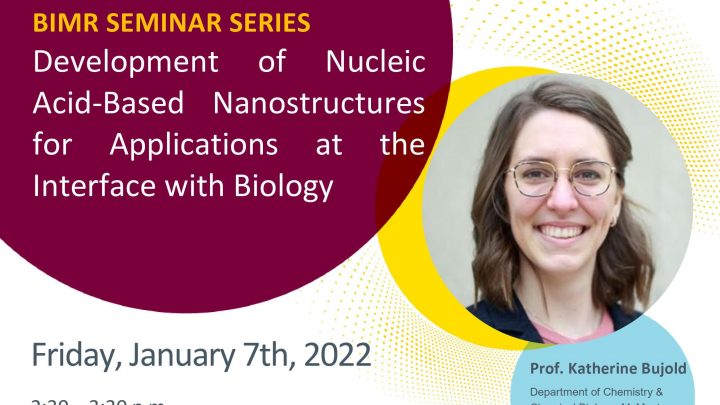Development of Nucleic Acid-Based Nanostructures for Applications at the Interface with Biology
Jan 7, 2022
2:30PM to 3:30PM

Date/Time
Date(s) - 07/01/2022
2:30 pm - 3:30 pm
Categories
Abstract:
The structural characteristics of DNA, including its molecular recognition properties, its programmable synthesis and its cooperative assembly into a double helix have greatly inspired modern sciences. The last three decades have seen the rise of DNA nanotechnology as an accessible approach to design and assemble well-defined DNA nanostructures with unprecedented control. Moreover, the biocompatibility of DNA predisposes it for therapeutic applications, both as a drug and as a selective drug delivery vehicle. However, DNA-based transporters are limited by their low cellular uptake and show rapid degradation in serum. The main goal of our research group is to address these shortcomings by developing strategies that will improve the biological properties of DNA nanostructures. These include 1) modulating their cellular uptake profile with synthetic insertions, 2) incorporating stimuli-responsive parts to enable the selective delivery of drugs and 3) improving the synthesis and incorporation of biologically relevant oligonucleotide modifications. Taken together, we expect the outcomes of this research will establish the relevance of DNA-based architectures for applications at the interface with biology.
Bio:
Katherine Bujold is an Assistant Professor in the Department of Chemistry & Chemical Biology at McMaster University. Her principal research interests reside in nucleic acid chemistry, DNA self-assembly and chemical biology. Her current work focuses on the synthesis of oligonucleotides and nucleic acid nanostructures with modified backbones to modulate their interactions with living systems. She was previously a Banting and International Institute for Nanotechnology Postdoctoral Fellow in Prof. Chad Mirkin’s group at Northwestern University where she developed an automated synthesis for oligonucleotides with guanidinium backbones and spherical nucleic acids with controlled surface charge. She completed her PhD under the supervision of Prof. Hanadi Sleiman at McGill University where she developed stimuli-responsive DNA nanostructures towards biological applications as an NSERC and FRQNT awardee.
Zoom Link:
https://mcmaster.zoom.us/j/95076586956?pwd=SVowT0NuZmg5aHdENXM2RTN6YWpXQT09

